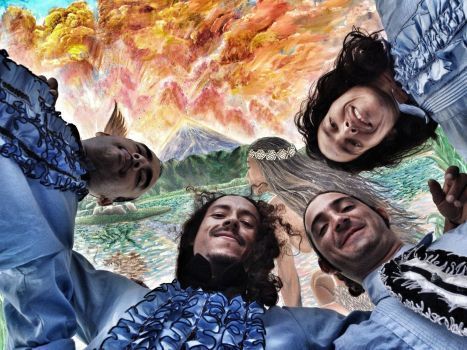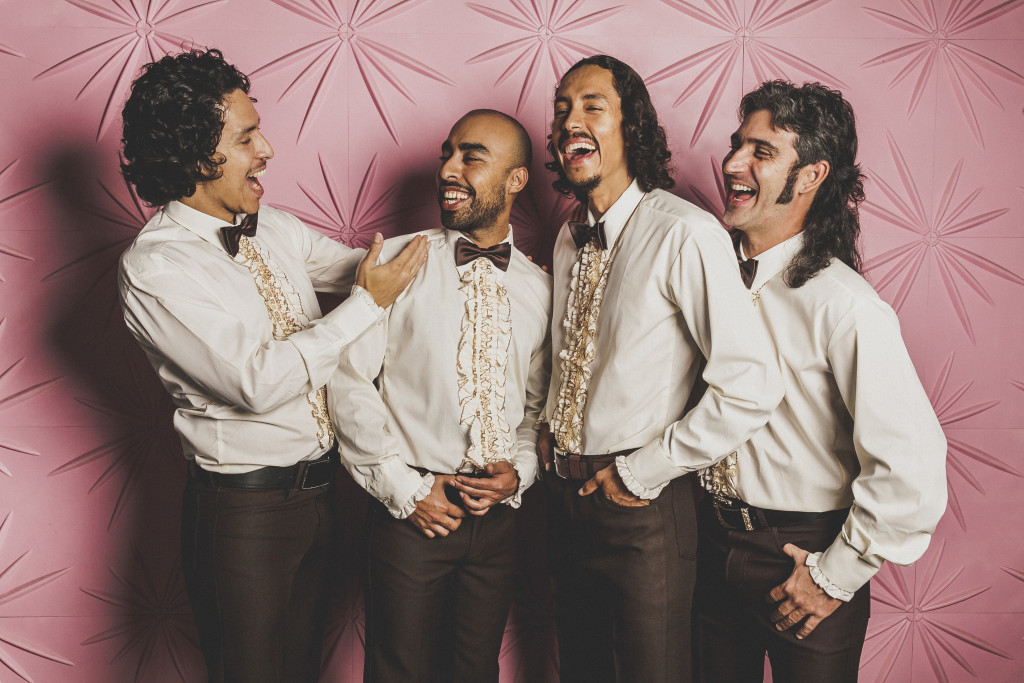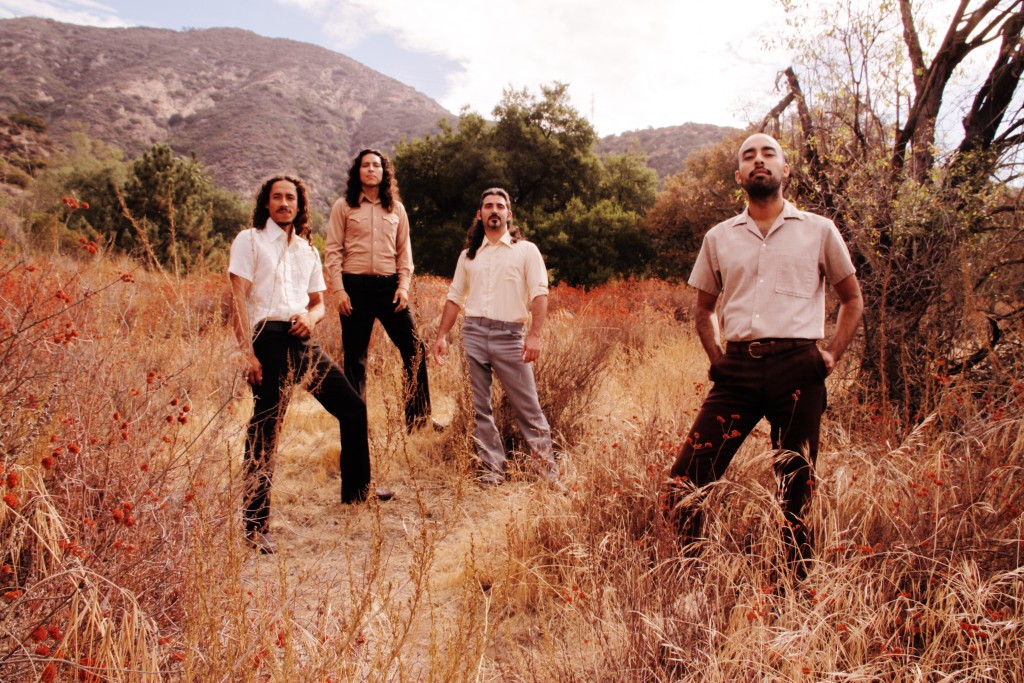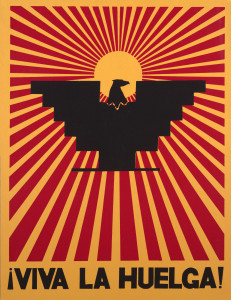First off: Chicano Batman easily has one of the best band names in music history. But more importantly, they are a powerful Latino rock band, one that combines psychedelic vision quest and soulful passion with easy, charismatic groove. Coming out of L.A.'s alternative Chicano music scene, they've attracted fans around the U.S. for their exuberant stage shows and their ability to transmit their genuine love for the music they play to their audiences. The band is currently making waves; They recently finished opening a leg of Jack White's recent tour, and are currently playing Coachella, the enormously popular California music festival. Our producer Sam Backer caught up with members of the band:
Sam Backer: Can you introduce yourself?
Carlos Arévalo: My name is Carlos Arévalo and I play guitar in Chicano Batman.
You’re having a big 2015 so far, no?
Yeah! Coachella! Being from Southern California--specifically the Inland Empire, which is what Coachella is inside of--I used to go to the festival when I was like 18, so like 12 years ago. I went for the first time in 2002 when Björk played and Mars Volta played one of their first shows ever. I remember the festival was half empty because it was still losing money at that time, it wasn’t turning profit. But I remember the idea of the festival was such a beautiful thing. It resonated with me and I went back the next year. And then I went back a few years later. The last time I went was 2007 when Rage Against the Machine performed. And now we’re playing Coachella, so that’s very exciting. That’s a bucket list thing for me. And we’ve got the Jack White tour. We’re opening for Jack White for select dates on his tour.
Which is huge! When I heard it I hadn’t thought of that connection, but it makes a lot of sense with your guys’ vibe to open for an audience that will really dig your stuff, but wouldn’t necessarily run into it otherwise.
Exactly. We want to play for anybody and everybody. I know a lot of times we get marketed as being “world music” or “Latin alternative,” but that can put you in a hole a little bit. The essence of what we’re doing--it’s some kind of take on rock ‘n’ roll when you really get down to it. There’s guitar solos. There’s a backbeat. But it's infused with all these other influences, and I think under that "world" umbrella--it’s such a malleable term. People can see that. I think it’s easier for people to give us a chance.
Going back to what you were saying about bands being pigeonholed, I think especially as part of the world music circuit, it can both be a way for bands to be exposed, but it can also hold them back.
Exactly. It’s a weird double-edged sword that people of color have to deal with, for whatever reason, when they play music. We love that we have that versatility and that flexibility to do that scene, but we still don’t want to be beholden to it only. We want to opportunities, like to play for Jack White’s audience. Because ultimately what we think we’re doing is really sincere and coming from a true place, and it can resonate with all types of musical genre fans. We want to appeal to everybody at the end of the day. We want to play with everybody. And just to go back to what I was saying about being pigeonholed, to clarify, we’re proud of our roots. We’re proud of who we are as people and where we come from. We’re happy that those influences bleed through our music.
One of the things that’s really cool about your music is that it mixes all these styles. It’s actually really hard to pin down and describe. It sounds like a lot of it should exist, but not much of it does. It sounds like pop music, but it’s not. It’s almost like this imagined alternative ‘70s.
Yeah, that’s a good take on it. I think it just comes from our various influences. We’re all very different personalities in the band, and whenever we put that in a blender, it comes out sounding like that. Bardo is our lead singer and primary songwriter. He’s really into soul music--black soul music from the U.S. in the ‘70s. But also one of the templates for the band is the bands that come from Latin America-- like Los Pasteles Verdes and Los Ángeles Negros. They’re a big influence on Chicano Batman. They have the organ as a main instrumentation--rhythm instrumentation. And they’re soul ballads, but a Latin American take on it.
Where are those guys from?
Los Pasteles are from Peru and Los Ángeles Negros are from Chile. They’re from the late ‘60s, early ‘70s. And their sound is really inspiring to us. That soul music, whether it be from Latin America or the U.S. We like the guitar hits on the two and four, fat bass and drum sounds. That’s a big inspiration for us--that kind of rhythm section.
Did you grow up with those records?
Me personally, I grew up as a rock ‘n’ roll head. I was into classic rock--Jimi Hendrix, Led Zeppelin. Bardo grew up with that stuff. Those are the records that his parents would play around the house. Same thing with Eduardo. So that music was within their blood and that’s what comes out in the band. And I guess you could say the psychedelic influences that I had growing up come through too. Gabriel, our drummer, is from Colombia. He’s heavily into cumbia music and salsa. He went and studied drums in France before he moved to the U.S. And so I think a lot of those rhythms come from him.
Do you feel like there are other bands that share a similar vibe or do you consider--I don’t know if there’s a better word for “friend bands” than “friend bands” but...
There is a community, a lot of it based in downtown L.A., East L.A. There are a lot of bands that we came up with. One of the groups that hit the big time, I would say, just for context, is La Santa Cecilia. They won the Grammy of course. I remember playing a party and Bardo’s house and Bardo’s old band was playing and La Santa Cecilia was playing at a backyard party. So anyways, La Santa Cecilia’s one of those groups that came out of the scene. Those guys are really big now. Other groups that have come up with us--there’s El Haru Kuroi, who are a trio that we love. They have a lot of Latin influences and rock influences, and they’re just a great band with a female singer and guitar player and they have a great rhythm section. They’re one of our favorite groups. There’s also a band called Thee Commons. They play psychedelic-surf-cumbia-rock ‘n’ roll type of stuff. And they’re a really great band. There’s also Buyepongo. They play cumbia, merengue, all types of dance music. There’s also Quitapenas. They’re another Afro-tropical group. They play dance music, high energy, fun. There’s also La Chamba who play chicha. There’s definitely a community. Those are all our friends and we all grew up together. A lot of them grew up with Eduardo. They’re from the same community.
How does the songwriting work?
There’s different ways. There’ve been songs that were completely composed by Bardo, our lead singer. And he’s our primary lyricist. He writes all the lyrics for the most part. And then Eduardo, our bass player--he’s a very talented guitar player also--he writes songs that are complete. And since I don’t sing, I write songs that pretty much have the template already done. And then I give it to Bardo to add lyrics or maybe change the arrangement around, so that it fits whatever lyrics he’s writing for the song. And then there are songs where we collaborate, where it’s more of a collaboration. So there’s no set way. I would say the majority of the songs are written by Bardo, but there’s no set way. If it’s a good song, we take it, no matter how it’s made. [organist/lead singer Bardo Martinez enters] Hey Bardo, this is Sam.
Bardo Martinez: What’s up, Sam?
CA: So he was asking me about the songwriting...
BM: Sure, I could answer any questions, you know, as a wrangler.
So I was looking through a lot of the interviews that you guys did and one of the things that I thought was really interesting, I forget who said it, was that "Love is political." And I was interested in how you guys write love songs that aren't apolitical love songs? I wondering what you guys thought of that.
B.M.: I think part of it is just like, I don't know. man, everything's political in its statement as an image, whatever image is out there is political someway, can be interpreted in that manner, you know what I mean? The fact that we're like playing on tour with Jack White is a political statement on his part. It's like... our ruffles represent a particular music style that we grew up with, you know, romantica, it's romantic music from Latin America. Everybody knows Enrique Iglesias, right? But there's all kind of artists within that vein of like soft pop, folk. There's just a plethora of groups from around that time...
What time is this?
B.M.: Late '60s, '70s- everybody used some kind of organ, whether it's Farfisa or a B3, everybody used acoustic bass amps. Which is the same instrumentation that people were using here in the States. So to us that's a very foreign thing in many different ways but I guess to go along with what we were talking about earlier, it's basically Latino music. And I guess that's basically the point, we're representing that past for ourselves, because we're proud of that. We're putting it out there as like a statement. That's us, that's ours, those are our stars, you know, just as much as James Brown or Sly and the Family Stone, you know, all those great bands in the United States. .
So it's almost a little bit of an historical mission. Classic rock is this really narrow band. And you're saying there's this bigger world beyond it.
B.M.: It's so wide you could go to Saigon, and listen to something very similar. Just pick up a record from there. And obviously we're at a time where there's a lot of compilations of music, what do they call them, where they reprint them?
[Eduardo Arenas, the group's bass player enters]
On your website it referred to you guys as ethnomusicologists of a sort.
B.M.: Yeah, well, you know, I got a master's degree in Latin American Studies, so I studied Andrés Landero, who was Colombian accordionist. And the whole point of the thesis I was to write about how music represents the people and how the people represent themselves through their music. I think it's a very obvious point, almost, but it's not, academically speaking. Not everyone perceives it that way, and it's important to see the power of music, that it is very very powerful.
Going back to the idea of love is political statement-- you really do consider those songs political. Like a subtle political statement, not an overt one.
B.M.: It's not overt yet, I guess. But I think our statement is very blunt and it speaks to a lot of people. I think people who grew up with this kind of music understand it right away. In LA, you know, which is very Latino, they understand the references because they grew up with it. Just the way you look, BAM, "That's my parent's records, I saw that somewhere." They've heard the same song--they just nail it, they tell us. "Say, eh, you guys sound like Los Pastelles Verdes." And I've heard that many times.
So you think there's a hunger for that sound? Like there aren't other bands that are referencing that?
Eduardo Arenas: There's not many bands referencing that, but I think it goes beyond that. I think people are hungry for music that carries nostalgic value. And whatever that nostalgic value is that connects them to the generation before them, that connects to cultural identity or some kind of roots that are maybe being lost in the times. The time of technology, the time of moving very fast. Like, our attention spans are decreasing, a lot of things are commercial. So what identifies, or what is the American culture? You know, if it's not consumerism or what we're being marketed on TV.
Sometimes it's pretty hard to create identity within a growing population, a new generation of people here, living in the United States and so, what do we connect to? In terms of music, we're talking about some of this Los Pasteles Verdes stuff, which is roots music to us because we grew up listening to that, our parents were listening to that. So we can connect it back to our family, and the power of hanging out together and sharing stories, and just shooting the shit, right? A moment of family and food and tradition, that kind of thing. I mean, it can go to that depth, and people are hungry for that kind of thing.
When I saw you guys at Brooklyn Night Bazaar, you guys had this crew of people just to see you. It was kinda amazing. You know you go to shows in Brooklyn, and lot of them have the same type of audience over and over. But when you guys were playing it was like "No- these are their fans."
B.M.: I think you know, the references are clear. I guess we're talking about politics and I think our symbol is pretty overt. The UFW [United Farm Workers], Chavez--and then the Batman symbol. That's pretty obvious for a lot of folks, particularly people in our generation.
"¡Viva La Huelga!" (Hurray for the Strike) Poster for United Farm Workers
E.A.: I think sometimes--the band, the things that we do--it opens up a door for people to feel like they belong to something. They identify with brown-skinned people playing music. It’s an open door for them. They feel comfortable. The music takes them completely somewhere else and they try something they haven’t heard before. It’s an open invitation, especially when we’re playing bigger and bigger stages, where there’s not a lot of Latino bands on that level. I’ve had a lot of people approach who say, “Keep doing what you’re doing, because it makes us want to do what we’re doing a lot better, too.” So that’s pretty empowering for us.
I was just thinking about what you were saying about the small things, like family, and how the music connects to that. I think one of the thing's that's really cool about your lyrics is the way they slip between these discrete, mundane things and this bigger universal viewpoint.
B.M.: Yeah, I really think that just like music is the representation of a macrocosm. When you think of life in general, as a piece of the universe, I think we have that spiritual perspective. We’re just part of the flow of things and we just want to live it. And, you know, I was thinking about it on my walk over here, walking around, I was thinking a lot of folks compete in music--it’s a really tough arts world--and on the surface sometimes we have this attitude, like “C’mon, we’ve got to do it tonight,” but in the soul of ourselves, all of us have the spirit of communion. We all want to commune with the people that we’re with, regardless of who they are, where they’re from. We want to build energy and just roll, you know what I’m saying? Because what are we going to do? There’s no reason to put ourselves down. On a personal level, being on a stage and being together, we’re there to lift everybody that’s with us and all around us. Just like living life, being on the street and smiling at somebody. You just want to have a positive vibration, so you know, that’s the vibe with us. That’s what’s really going to push humanity forward, in general.
Talking more specifically, about “Cycles of Existential Rhythm” and “Wednesday Morning”...
B.M.: Yeah, we’ve got to start with “Cycles.” It’s pretty clear and easy for me to explain. Carlos had an instrumental track and he played with his previous band. So I downloaded the track from Myspace, and it was something that I listened to all the time. I put it on CD, and I would rock that shit everywhere. It was something I listened to all the time. I really liked it. I sang on it, myself, just trying to envision… Because I really liked it a lot. It was a beautiful song. So when it came down to creating the material, I said, “I want to do this song.” And writing the lyrics, I had experiences with that song throughout my life. This one moment particularly, on New Year’s night, I was playing with another band and just finished, and there was this crazy moment I had with my ex. I was going to her house, and it was just kind of this epic moment, it was my ethereal moment. I was just vibing on life right there, and I was listening to the track in my car. That was the sense of that track then. And so that track is how I felt. It starts out with how I felt in that moment, driving and bumping this song. I’m talking about that moment, but I’m in the future now looking back. We’re all connected in crazy ass different ways. I mean, indigenous folks, everybody. I don’t necessarily think it's just indigenous folks, I think that’s a misnomer. That’s a myth. Europeans are indigenous. Everybody is indigenous. It’s just that throughout history, we’ve left the roots, tossed away the belief that we should follow the laws of nature. We live against the laws of nature. We go to sleep at 4 in the morning, instead of 6 when the sun sets.You’re going somewhere cyclical. Everything’s a cycle, you know what I mean. So for me, it relates to everything.
Do you have another album or EP in the works?
E.A.: We’re all in different places on that. Bardo wants to put out another full length. We have a lot of things on the table. We want to record another EP. We are all in agreement on that. Put stuff on vinyl. Press 45s. Vinyl sells really good right now. It’s not a selling point, but it’s a culture point. And songs can sounds different, they can sound really unique when it’s on a 45 as opposed to an album. It doesn’t have to be as cohesive. And you can kind of breathe.
We did a score for a PBS documentary on the Latino experience in the Vietnam war, which is really relevant for us. My dad is a war veteran and he got drafted. So it was kind of cool to connect with my dad, as he sees the movie, going in, talking to him, listening. It’s real shit. He talks to us about everything. We talked about everything growing up. It’s funny because I’ve always been interested in Latinos in Vietnam because of my dad. And we got to score some very emotional scenes about a lot of different things that were happening in the movie. It was our first one ever and we want to do it again.We’re pretty good at it. We’re pretty efficient and we find ourselves very comfortable in that world, in the studio. Very self-sufficient.
How did that come about?
E.A.: There’s Abel Salas, and he’s the publisher of a newspaper called Brooklyn & Boyle in Boyle Heights in LA. And he’s a big fan, an old friend. And the director was talking to him about needing to do a score. He said, “Try Chicano Batman.” And the director liked it and sent us the text. Bardo was the first one to react. And then we worked out a deal. We looked at the first draft of the movie and were blown away by it, and were like, “We’ve got to do this.”
That’s awesome.
B.M.: It’s really great to be part of an anti-war message. It’s not anti-soldier. It’s about the soldiers. The thesis is that war is no good for nobody.
E.A.: Which is what we stand for also. War sucks. We should spend money on education or something.
I agree. I think it’s this funny time where, for whatever reason, because, especially given the last six months of politics in the U.S., I don’t think you can say everybody’s really cynical anymore, but just being able to say something like that in music and have that be a central pillar--I think a lot of bands are all politics or hands off on politics, and it’s cool to see. And sometimes I think both are equally bad. I love Rage Against the Machine. They’re great, but sometimes you don’t want to hear this super political thing, but you want it to be politically informed. I think it’s really cool that you guys bridge those worlds.
E.A.: Yeah, I think one of the guys from the Roots was like, “Why isn’t anybody talking about anything?” Like, “Hey, c’mon. Let’s go! Somebody say something." Consciousness has to breed reality and honesty, so if you believe in something, you’ve got to let it breathe. You don’t have to be overtly one way, because you also pigeonhole yourself. But like I remember reading a bunch of activists saying, “What happened to all the black hip-hop artists? Where are you guys? You guys are letting us down. You have some of the biggest voices in the world. This is the United States. People listen to you. Why don’t you come through?” Somehow, it’s like a moral obligation sometimes. You become the vehicle for reaching the most people possible. You’re not even saying anything. You’re just playing music. So if you put something on top of that, some sincerity on top of your music, you’ll really be powerful.












